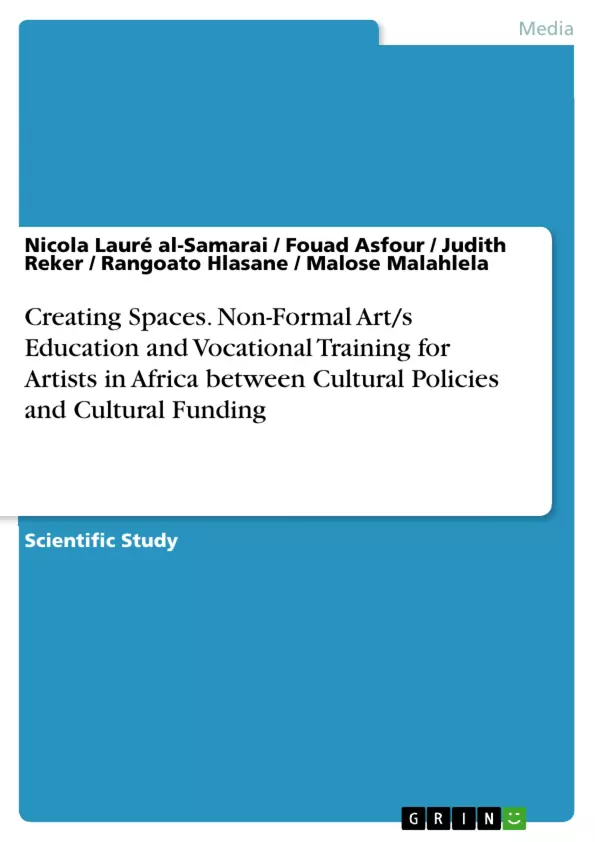The field of non-formal art/s education and vocational training for artists in Africa leads a shadowy existence. Although embracing the vital interface of education/art/culture, related approaches and projects frequently fail to meet the prevalent funding frames. However, African actors have long been autonomously contouring and shaping the interstitial space of non-formality with their ideas, concepts, and practice. What concrete form does their work take? What basic conditions is it subject to? Which formative effects are caused by current cultural and funding policies? These and other questions are elaborated in this volume with special reference to five actors in South Africa, Senegal, Democratic Republic of Congo, and Ethiopia.
The authors are:
Nicola Lauré al-Samarai, Fouad Asfour, Judith Reker, Rangoato Hlasane and Malose Malahlela
Inhaltsverzeichnis (Table of Contents)
- Preface
- Acknowledgments
- Authors' Note
- Introduction
- Chapter 1
Discursive Locating
Framing the Field of Art/s Education and Vocational Artistic Training and Professionalization - Chapter 2
Prior to Entry
A Critical Attunement to Field Research - Chapter 3
Fragmentary Depictions
Shaping the Field of Non-Formal Artistic Education/Training and Professionalization - Chapter 4
Formative Effects
Non-Formal Vocational Artistic Training and Professionalization within the Context of Western Cultural Funding - Chapter 5
Bigger than the Tick Box
Defining Interdisciplinary Art/s Education to Funders in South Africa
by Rangoato Hlasane and Malose Malahlela
Keleketla! Library - Chapter 6
The Challenges of Interstitiality
Reconsidering Cultural and Funding Policies for the Non-Formal Artistic/Cultural Field
Zielsetzung und Themenschwerpunkte (Objectives and Key Themes)
This work aims to critically examine the landscape of non-formal art/s education and vocational training for artists in Africa, focusing on the interplay between cultural policies and funding mechanisms. The authors explore the challenges and opportunities that artists face in navigating these complex systems, highlighting the need for a more inclusive and equitable approach to supporting artistic development in the region. Key themes explored in the text include:- The role of cultural policies and funding in shaping the field of art/s education and training
- The challenges and opportunities faced by artists in accessing training and professional development
- The importance of interdisciplinary approaches to art/s education
- The need for more equitable and inclusive funding models
- The impact of Western cultural funding on African artistic practices
Zusammenfassung der Kapitel (Chapter Summaries)
- Chapter 1: Discursive Locating This chapter lays the groundwork for the book by framing the field of art/s education and vocational artistic training in Africa. It examines the various discourses and debates surrounding artistic development in the region, highlighting the need for a more nuanced and context-specific understanding of the field.
- Chapter 2: Prior to Entry This chapter delves into the research methodology employed throughout the book, providing a critical attunement to the field research undertaken. It examines the complexities of conducting research in a field marked by diverse perspectives and historical contexts.
- Chapter 3: Fragmentary Depictions This chapter explores the diverse practices and approaches to art/s education and training that exist across Africa. It analyzes the fragmentation of the field and the challenges of creating a coherent narrative that captures the richness and diversity of these practices.
- Chapter 4: Formative Effects This chapter investigates the impact of Western cultural funding on non-formal vocational artistic training and professionalization in Africa. It examines the ways in which external funding models can shape and influence artistic practices, raising questions about the role of cultural imperialism in the field.
- Chapter 5: Bigger than the Tick Box This chapter explores the concept of interdisciplinary art/s education and its relevance to funders in South Africa. It argues for a more inclusive and nuanced understanding of artistic practice, one that recognizes the interconnectedness of disciplines and the need for a holistic approach to supporting artists.
- Chapter 6: The Challenges of Interstitiality This chapter focuses on the challenges of navigating the spaces between cultural policies and funding mechanisms. It argues for a more responsive and adaptive approach to supporting the non-formal artistic and cultural field, one that recognizes the need for flexibility and innovation.
Schlüsselwörter (Keywords)
This work explores the complex relationship between art/s education, vocational training, cultural policies, and funding mechanisms in Africa. Key keywords include: non-formal education, artistic development, cultural policy, funding, interdisciplinarity, inclusivity, equity, western cultural funding, artistic practices, and the African context.Frequently Asked Questions
What is the main focus of the book "Creating Spaces"?
The book focuses on non-formal art/s education and vocational training for artists in Africa, specifically examining the intersection of cultural policies and funding mechanisms.
Which African countries are specifically analyzed in this volume?
The research refers to five actors located in South Africa, Senegal, Democratic Republic of Congo, and Ethiopia.
Who are the authors of this publication?
The authors are Nicola Lauré al-Samarai, Fouad Asfour, Judith Reker, Rangoato Hlasane, and Malose Malahlela.
What are the key themes explored regarding cultural funding?
Key themes include the impact of Western cultural funding on African practices, the need for more equitable and inclusive funding models, and the challenges of meeting prevalent funding frames.
What is discussed in the chapter "Bigger than the Tick Box"?
This chapter explores interdisciplinary art/s education in South Africa and argues for a more nuanced understanding of artistic practice that recognizes the interconnectedness of disciplines.
What does the term "interstitiality" refer to in this context?
It refers to the spaces between cultural policies and funding mechanisms where non-formal artistic and cultural work takes place, requiring flexible and innovative support approaches.
- Arbeit zitieren
- Nicola Lauré al-Samarai (Autor:in), Fouad Asfour (Autor:in), Judith Reker (Autor:in), Rangoato Hlasane (Autor:in), Malose Malahlela (Autor:in), 2015, Creating Spaces. Non-Formal Art/s Education and Vocational Training for Artists in Africa between Cultural Policies and Cultural Funding, München, GRIN Verlag, https://www.grin.com/document/288136



